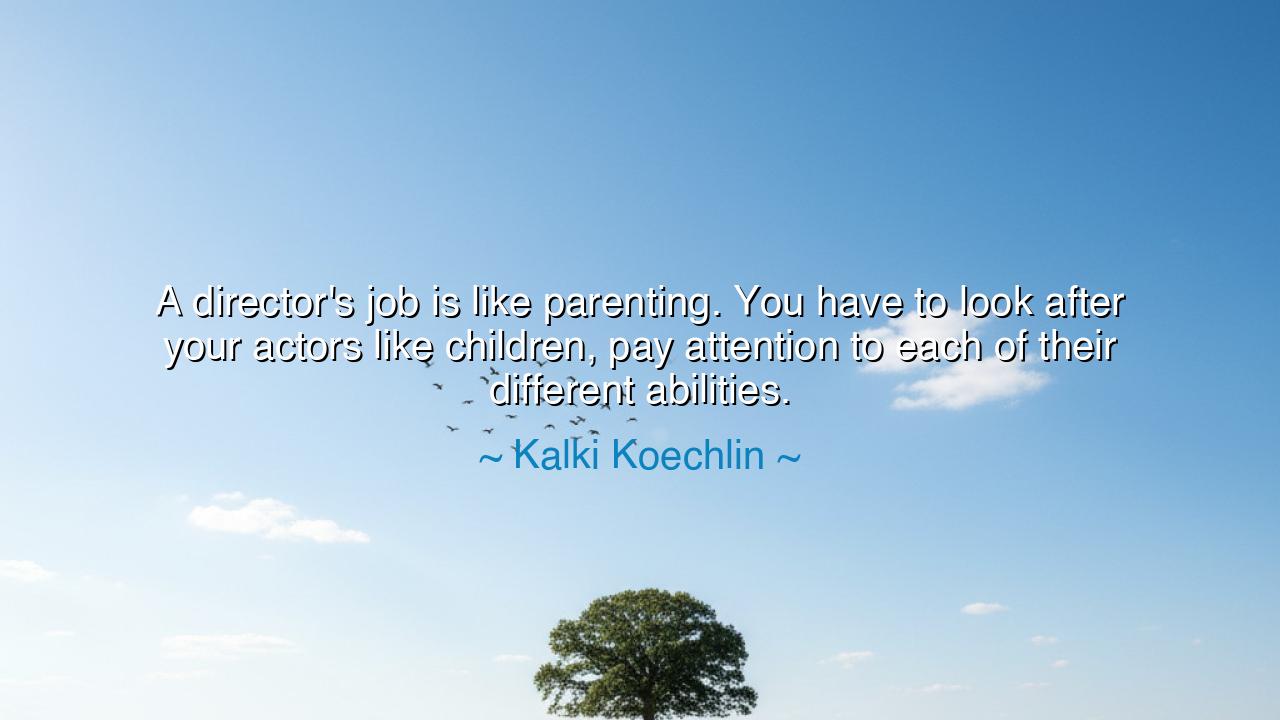
A director's job is like parenting. You have to look after your
A director's job is like parenting. You have to look after your actors like children, pay attention to each of their different abilities.






Hearken, O children of generations yet unborn, and lend ear to the profound words of Kalki Koechlin, whose voice draws wisdom from both art and life: “A director's job is like parenting. You have to look after your actors like children, pay attention to each of their different abilities.” In this reflection lies a truth as old as leadership itself: that guidance is not uniform, that every soul requires attentive care, and that the flourishing of a collective depends upon the recognition and nurturing of individual strengths and potential.
The origin of this reflection rests in Koechlin’s life as an actor and observer of the theater, where the director assumes a sacred role akin to that of a parent. The director shapes not only the performance, but the spirit of each participant, guiding, protecting, and drawing forth the abilities that lie latent within. She perceives the parallel between art and nurture: in both, one must balance attention, encouragement, discipline, and freedom, attending to the unique character of each individual while striving toward a harmonious whole.
The meaning of her words is both practical and moral. To direct is to observe, understand, and respond to the distinctive abilities of each actor, just as a parent observes and nurtures the talents, temperament, and needs of a child. No two actors—or children—are alike, and the task of the guide is to cultivate confidence, skill, and insight, allowing each to contribute fully while growing individually. Koechlin teaches that leadership, like parenting, is not about uniformity, but about attentiveness and intentional care.
Consider the example of Sir Laurence Olivier, whose direction of young actors in the Royal Shakespeare Company combined discipline with nurturing attention. He recognized the distinct temperaments of each performer, guided them through their insecurities, and drew forth their strengths. Under his stewardship, both the collective performance and the individual artistry flourished. Like Koechlin’s insight, Olivier’s example reveals that attentive guidance, rooted in understanding, produces excellence that is both personal and communal.
Yet Koechlin’s words also carry a subtle admonition: the act of nurturing demands vigilance, patience, and empathy. A director—or parent—must balance authority with support, discipline with encouragement, and expectation with acceptance. Each individual’s abilities must be respected and developed, rather than imposed upon or forced to conform. In this lies the secret of lasting growth, whether on the stage or in life itself.
The lesson for future generations is radiant: to guide others—whether children, students, or collaborators—is to observe carefully, honor differences, and cultivate potential. Success is not imposed, but nurtured, emerging from the careful attention to each individual’s needs, gifts, and challenges. Koechlin teaches that the art of leadership is inseparable from the art of care, and that the well-being and flourishing of the collective depend upon the acknowledgment of individuality.
In practical life, one may follow Koechlin’s counsel by practicing attentive observation, empathy, and personalized guidance. Recognize the strengths and challenges of those you lead, mentor, or teach. Provide encouragement, instruction, and space for growth. Celebrate uniqueness while fostering collaboration, and attend to both personal development and collective harmony. In doing so, one cultivates not only skill but trust, confidence, and resilience.
Thus, O children of future ages, carry this teaching as both lamp and compass: the wisdom of parenting and directing are intertwined. Attend to the hearts and abilities of those entrusted to your care, guide with understanding and patience, and foster their growth with intentionality and love. In this sacred labor, both the individual and the collective flourish, and the legacy of guidance endures across generations, shaping souls, talents, and communities alike.






AAdministratorAdministrator
Welcome, honored guests. Please leave a comment, we will respond soon